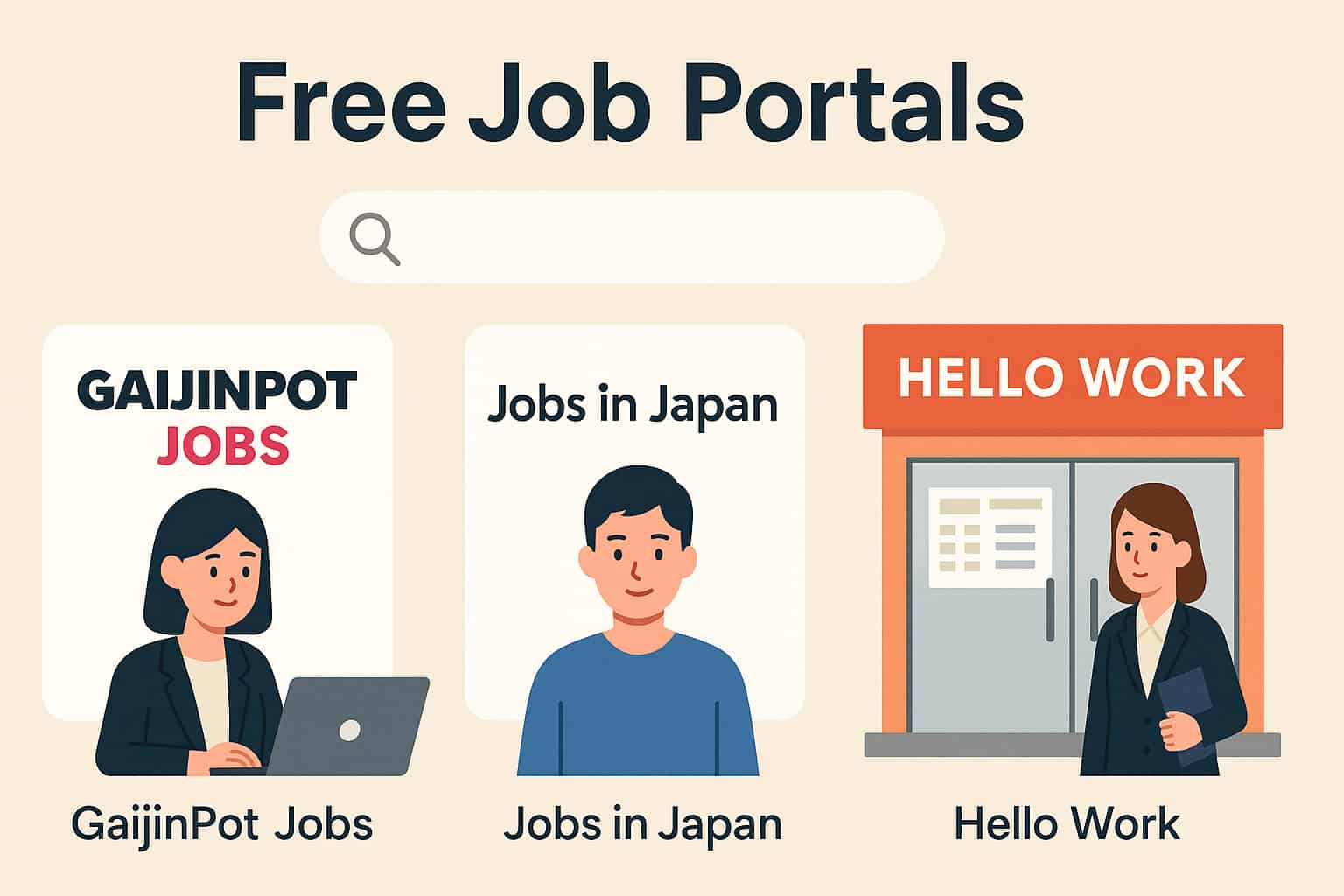The Best Job Portals for Foreigners in Japan (Free, Paid & Developer Platforms
Please support us by sharing!

Finding job in Japan as a foreigner can feel overwhelming at first, especially with the mix of language barriers, cultural expectations, and unique hiring practices. The good news? There are job platforms designed to help you connect with the right opportunities, whether you are looking for part-time job, your first tech job in japan, or a senior management position. In this guide, we’ll walk through a carefully curated list of the most reliable free job boards, premium career platforms, and tech-focused job portals. Each one caters to different skill sets, career levels, and visa situations, so you can focus your search where it counts and avoid wasting time on dead ends.
If you also want to know which companies are actively hiring foreigners right now, check out our guide on Top 10 Companies Hiring Foreigners in Japan.
Global Platforms Popular in Japan
Japan-only job sites are good, but big international platforms like Indeed and LinkedIn also have many good openings, especially in multinational companies and startups where English is the main language.
While studying for my master’s in computer science in Kyoto, my Japanese speaking skills were close to zero. However, I had strong coding experience from my hometown and my bachelor’s degree in India, which turned out to be my biggest asset. I started searching on Indeed Japan for “backend developer” and “visa sponsorship” roles. Within a few days, a company in Nagoya reached out. After completing a backend coding task and passing online interviews, I received my first job offer in Japan—proof that even without fluent Japanese, solid technical skills can open the right doors.
- Use both English and Japanese keywords (e.g., backend / バックエンド).
- Enable instant email/app alerts to apply as soon as new roles are posted.
- Highlight backend projects and frameworks you’ve mastered (e.g., PHP, Laravel, Node.js).

Indeed Japan
Indeed Japan aggregates roles from company sites and agencies.
Pros: Massive listings, solid filters, quick apply with stored CV.
Cons: Many posts are Japanese‑only—use bilingual keywords.
Tip: Combine stack + Japanese term (e.g., “React エンジニア” / “PHP 開発者”) for broader hits.
LinkedIn Japan
LinkedIn Japan is strong for mid‑senior roles and direct recruiter outreach.
Pros: Easy networking, “Apply with LinkedIn,” English‑friendly companies.
Cons: Fewer entry‑level roles; some teams expect business‑level Japanese.
Tip: Engage with Japan‑based recruiters and join local tech groups to see roles before they’re widely posted.
Free Job Portals
These platforms are completely free for job seekers, making them an excellent starting point for finding work in Japan. Whether you’re seeking part-time work, teaching positions, or entry-level corporate roles, these sites give you broad access to the job market without any upfront cost.

GaijinPot Jobs
GaijinPot Jobs is one of the most recognized job boards for English-speaking foreigners in Japan. It covers a wide range of categories—teaching, IT, hospitality, recruitment, and service industries. Job postings on GaijinPot are usually in English, and employers often accept applications in English as well, which is very helpful for foreign job seekers.
Pros:Easy to use, User friendly search filters (by location, industry, visa status), direct online applications, and active job posting volume.
Cons: Highly competitive for well-known companies, many roles require at least conversational Japanese.
Jobs in Japan
Jobs in Japan is another foreigner-focused platform. It lists opportunities from eikaiwas (English conversation schools) to IT positions and hospitality work. Some postings cater to people with zero Japanese, while others require advanced proficiency.
Pros: No account needed to browse listings, detailed job descriptions, and salary transparency on most job postings.
Cons: Smaller database than GaijinPot, but more direct listings from small-to-medium companies.
Hello Work (Government Employment Agency)
Hello Work is Japan’s official government-run employment service. Every prefecture has its own Hello Work office, and you can also access listings online. While the majority of postings are in Japanese, many branches in major cities like Tokyo, Osaka, and Fukuoka have dedicated “Foreigner Employment Service Centers” with English-speaking staff.
Pros: Extensive database covering all industries, legal job postings with proper contracts, and free in-person career guidance. Some offices help with resume writing in Japanese.
Cons: Most listings are in Japanese; online search interface can be challenging for non-Japanese speakers.
Tip: If you’re in Tokyo, visit the Tokyo Employment Service Center for Foreigners—they offer one-on-one consultations in English and can guide you to employers open to hiring foreign staff.
Developer & Tech-Focused Platforms
If you’re in IT, software engineering, or any technical field, Japan has dedicated job portals that focus on developer roles. These sites often cater to English speakers, offer visa-sponsoring companies, and list positions that are remote-friendly or open to overseas applicants.

Japan Dev
Japan Dev curates hand-picked jobs from tech companies in Japan, with a focus on modern work cultures and competitive salaries. Many roles are available to candidates applying from abroad, and listings are in English with clear visa information.
Pros: High-quality listings, remote work options, companies with international work environments.
Cons: Primarily for experienced developers; fewer junior positions.
Tip: Use their filters for “Visa Sponsorship” and “Apply from Overseas” to find roles that match your situation.
View overseas-eligible roles here: Remote & Overseas Jobs
TokyoDev
TokyoDev is a trusted resource for software engineering positions in Japan, especially for those who may not speak Japanese fluently. It includes detailed company profiles, salary ranges, and work culture notes.
Pros: Many listings don’t require Japanese, clear salary transparency, and strong community blog with developer interviews.
Cons: Primarily tech-focused; limited non-engineering roles.
Tip: Follow their jobs page for real-time postings, and explore their “Apply from Abroad” filter if you’re outside Japan.
WeXpats Jobs
WeXpats Jobs is a multilingual job board that covers various industries, including tech and IT roles. You can filter jobs by Japanese language requirements, making it beginner-friendly for those still learning the language.
Pros: Supports multiple languages (English, Chinese, Korean, Vietnamese), wide range of listings, and easy search filters by skill and proficiency.
Cons: Some tech jobs require business-level Japanese; part-time jobs may dominate search results if not filtered.
Tip: Use keyword searches like “developer” or “engineer” and set Japanese proficiency to “None” or “Basic” for English-only roles.
Working JAPAN
Working JAPAN is a multilingual recruitment portal aimed at helping foreigners find work in Japan, including from overseas. It features jobs across industries, but also includes IT and engineering positions with visa sponsorship.
Pros: Multilingual interface, easy to apply from abroad, and a mix of industries including tech.
Cons: Smaller job volume compared to bigger sites.
Tip: Check the “Recruitment from Overseas” category for positions where relocation support is provided.
Paid & Premium Job Platforms
These platforms focus on mid-to-senior level roles, career growth opportunities, and executive-level positions. Some require a paid membership to unlock premium features, while others charge employers but keep applications free for job seekers. They are best for professionals with several years of experience, bilingual skills, and a clear career trajectory.

Daijob
Daijob is one of the biggest job sites in Japan for people who know both Japanese and English. It mainly lists professional jobs where you need to speak both languages. Industries range from IT and finance to manufacturing and marketing, with many multinational companies posting exclusively here.
Pros: Strong international company network, bilingual listings, career fair events, and resume visibility to recruiters.
Cons: Many postings require business-level Japanese (JLPT N2 or above).
Tip: Attend their Daijob Career Fair to meet employers face-to-face and improve your hiring chances.
CareerCross
CareerCross is another well-established bilingual job portal, offering detailed listings with employer profiles. It’s particularly strong in IT, finance, HR, and marketing roles.
Pros: Detailed job descriptions, visible employer names, and clear salary ranges.
Cons: Less suited for beginners; most roles require experience in Japan or relevant international expertise.
Tip: Create a detailed candidate profile with keywords relevant to your skills so recruiters can find you directly.
Smart Strategies to Maximize Your Search
Finding a job in Japan as a foreigner isn’t just about applying everywhere—you need a focused strategy. Here are some proven tips to help you stand out and speed up your job hunt:
- Mix general and niche platforms: Use large job boards like GaijinPot or Jobs in Japan for broad exposure, but also check industry-specific sites such as TokyoDev or Japan Dev for targeted opportunities in tech or other specialties.
- Set up custom job alerts: On platforms like TokyoDev and Japan Dev, create alerts for keywords such as “remote,” “visa sponsorship,” or your exact job title. This way, you’ll be among the first to apply when new listings appear.
- Prepare multiple resume formats: Many Japanese employers expect a Rirekisho (Japanese resume) and a Shokumu Keirekisho (career history document). International companies may prefer a Western-style CV. Tools like Rirekisho Builder can save time and ensure your documents match Japanese standards.
- Network actively: Beyond job boards, connect with professionals through GitHub, LinkedIn, or Japan-focused Slack and Discord communities. Joining online meetups or tech events in Japan can help you hear about openings before they’re posted publicly.
- Verify every opportunity: Before accepting an interview or offer, research the company’s website, reviews, and reputation. Avoid postings that lack clear company information, use only messaging apps for contact, or require fees from applicants.
Conclusion
Whether you're starting with free general listings or targeting high-level tech roles, there’s a platform for every need:
- General roles: Use GaijinPot, Jobs in Japan, or Hello Work.
- Tech-focused: Explore Japan Dev, TokyoDev, or WeXpats for IT jobs.
- Senior careers: Consider Daijob, CareerCross, or BizReach.
